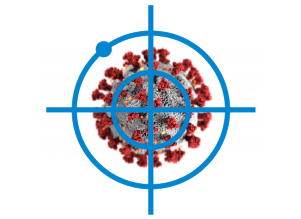Antibodies have extraordinary potential as agents for the treatment of COVID-19 or possible prevention of infection by SARS-CoV-2, the coronavirus that causes the disease. Anti-SARS-CoV-2 antibodies can neutralize the virus, and antibodies that target inflammatory factors such as cytokines can ameliorate symptoms of COVID-19.
The Antibody Society’s series “Coronavirus in the crosshairs” examines the discovery and development of all types of interventions for COVID-19. In Part 3 of the series, we focus on the use of natural antibodies, i.e., anti-SARS-CoV-2 polyclonal antibodies found in convalescent plasma, in treating COVID-19. In the current emergency when time is of the essence, medical professionals are applying the century-old knowledge that antibody-rich plasma derived from blood donated by people who have recovered from a disease may aid other patients. The efficacy of convalescent plasma was studied in outbreaks of other respiratory infections, including the 2009-2010 H1N1 influenza virus pandemic, 2003 SARS-CoV-1 epidemic, and the 2012 MERS-CoV epidemic. [1, and references therein]
There is, however, no current evidence from randomized controlled trials to recommend any specific anti-SARS-CoV-2 treatment for patients with suspected or confirmed SARS-CoV-2 infection.[2] Anti-SARS-CoV-2 blood products are thus considered investigational drugs that require clinical study and approval by regulatory agencies before they can be administered broadly to treat COVID-19 patients or potentially prevent disease in healthy people, such as health care workers.
FDA response to the need for COVID-19 convalescent plasma
To address the short-term need for treatments, the US Food and Drug Administration (FDA) is facilitating access to COVID-19 convalescent plasma for use in patients with serious or immediately life-threatening COVID-19 infections through emergency Investigational New Drug Applications that will enable administration to a single patient. Highly time sensitive requests will receive a response from FDA within 4 to 8 hours.[3]
In the longer-term, FDA is working with other agencies, such as the National Institutes of Health and the Centers for Disease Control and Prevention, to develop master protocols for use by multiple investigators in order to coordinate the collection and use of COVID-19 convalescent plasma.[3]
Ongoing clinical studies of convalescent plasma
Medical professionals in countries greatly affected by COVID-19, such as China and Italy, are evaluating plasma-based treatments for COVID-19. Clinicaltrials.gov lists several clinical studies evaluating the use of convalescent plasma:
- NCT04292340. In this observational study recruiting patients at the Shanghai Public Health Clinical Center, the investigators collected the clinical information and clinical outcomes of the COVID-19 patients using anti-2019-nCoV inactivated convalescent plasma. The study objective is to evaluate the efficacy and safety of anti-2019-nCoV inactivated convalescent plasma in the treatment of COVID-19 pneumonia. Primary outcome measures are the virological clearance rate of throat swabs, sputum, or lower respiratory tract secretions at day 1, 3 and 7, and the patient outcome at 4 weeks. The actual study start date is February 1, 2020 and the estimated primary completion date is July 31, 2020.
- NCT04321421. In this study being conducted in Italy, 49 participants are administered plasma from donors recovered from COVID-19 as therapy at day 1 and, based on clinical response, on day 3 and 5., The dose, 250-300 mL of convalescent plasma, was selected based on published literature for this type of therapy. The primary outcome measure is death from any cause within 7 days. The actual study start date is March 17, 2020 and the estimated primary completion date is May 31, 2020.
Similar trials are listed on the Chinese clinical trials registry, e.g.,
- ChiCTR2000030841, Exploratory study for immunoglobulin from cured COVID-19 patients in the treatment of acute severe novel coronavirus (COVID-19); study registered March 15, 2020.
- ChiCTR2000030929, A randomized, double-blind, parallel-controlled trial to evaluate the efficacy and safety of anti-SARS-CoV-2 virus inactivated plasma in the treatment of severe novel coronavirus pneumonia (COVID-19); study registered March 17, 2020.
New plasma-derived COVID-10 product candidates in development
On March 4, 2020, Takeda Pharmaceutical Company Limited announced that they are initiating development of an anti-SARS-CoV-2 polyclonal hyperimmune globulin (H-IG) to treat high-risk individuals with COVID-19. Referred to as TAK-888, Takeda plans initially to produce the plasma-derived anti-SARS-CoV-2 polyclonal H-IG in a segregated area within its manufacturing facility in Georgia.
On March 11, 2020, Emergent BioSolutions Inc. announced that it has initiated development of two product candidates for the treatment and prevention of coronavirus disease (COVID-19). COVID-HIG, manufactured from human plasma with antibodies to SARS-CoV-2, will be developed as a potential treatment for severe hospitalized patients as well as protection for at-risk individuals. In parallel, COVID-EIG, manufactured from plasma of immunized horses with antibodies to SARS-CoV-2, will be developed as a potential treatment for severe hospitalized patients. Emergent has initiated plasma collection efforts for both human and equine platforms with a goal of manufacturing clinical material within the next four to five months in anticipation of beginning a clinical study as early as the third quarter of 2020.
Upcoming “Coronavirus in the crosshairs” posts
In Part 4 of “Coronavirus in the crosshairs”, we will discuss recombinant antibodies that may ameliorate symptoms of COVID-19, and examine ongoing efforts to discover and develop recombinant anti-SARS-CoV-2 antibodies.
1. Chen et al. Convalescent plasma as a potential therapy for COVID-19. The Lancet. February 27, 2020. DOI:https://doi.org/10.1016/S1473-3099(20)30141-9
2. World Health Organization. Clinical management of severe acute respiratory infection when novel coronavirus (2019-nCoV) infection is suspected. Interim guidance. 28 January 2020.
3. US Food and Drug Administration. Investigational COVID-19 Convalescent Plasma – Emergency INDs. March 24, 2020.
Photo by Fusion Medical Animation on Unsplash



